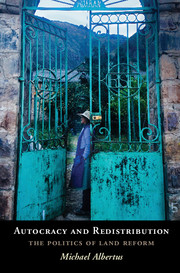Book contents
- Frontmatter
- Contents
- List of Tables
- List of Figures
- Acknowledgments
- 1 Introduction
- 2 Actors, Interests, and the Origins of Elite Splits
- 3 A Theory of Land Reform
- 4 Measuring Land Reform
- 5 A Cross-National Analysis of Land Reform in Latin America
- 6 Elite Splits and Redistribution under Autocracy: Peru's “Revolution from Above”
- 7 Land Reform Transformed to Redistribution: Venezuela's Punto Fijo Democracy and Chávez's Bolivarian Revolution
- 8 Latin America in Comparative Perspective
- 9 Conclusion
- References
- Index
- Other Books in the Series
9 - Conclusion
Published online by Cambridge University Press: 05 October 2015
- Frontmatter
- Contents
- List of Tables
- List of Figures
- Acknowledgments
- 1 Introduction
- 2 Actors, Interests, and the Origins of Elite Splits
- 3 A Theory of Land Reform
- 4 Measuring Land Reform
- 5 A Cross-National Analysis of Land Reform in Latin America
- 6 Elite Splits and Redistribution under Autocracy: Peru's “Revolution from Above”
- 7 Land Reform Transformed to Redistribution: Venezuela's Punto Fijo Democracy and Chávez's Bolivarian Revolution
- 8 Latin America in Comparative Perspective
- 9 Conclusion
- References
- Index
- Other Books in the Series
Summary
Despite rapid rates of urbanization and development, just less than half of the world's population still lives in the rural sector. Most of these individuals dedicate themselves to agriculture. Those that already own land work feverishly to retain and exploit it. Yet many of them wake up every day dreaming to own a plot of land that they can farm to feed their family, to insure themselves against capital or employment losses, and to have the freedom to allocate their labor as they wish.
This book seeks to explain why governments sometimes choose to allocate land to these rural laborers and at other times guard the privileges of large landowners. In doing so, it marshals a century of evidence spanning from broad cross-country trends to micro-level details about the machinations of elites.
I draw several important conclusions. First, the most redistributive type of land reform is implemented when there is a coalitional split between ruling political elites and landed elites alongside low institutional constraints. Land redistribution of this variety makes waves. With sufficient scope, it has the power to decimate landed elites and create a new class of smallholding peasants. These reforms can be eroded or transformed by subsequent governments in ways that hang peasants out to dry, but they can never be entirely rolled back. The autocratic or majoritarian democratic governments that implement them are thus critical players in a country's long-term political and economic development. Popular rural pressure can ratchet up the scope of land redistribution but only when the political conditions are ripe for redistribution in the first place.
Given the overwhelming strength of this finding, it is surprising that landowners seemingly so often feared democratic transitions, as Barrington Moore, Alexander Gerschenkron, and others have long noted. Large landowners in countries that democratized in the late twentieth century, such as Brazil, Colombia, El Salvador, the Philippines, and South Africa, have not only avoided being soaked by the masses; they have thrived. Perhaps landowners in these countries were not as sanguine as they should have been about their capacity to act as cogs in the wheel of land reform efforts under democracy.
- Type
- Chapter
- Information
- Autocracy and RedistributionThe Politics of Land Reform, pp. 304 - 320Publisher: Cambridge University PressPrint publication year: 2015



